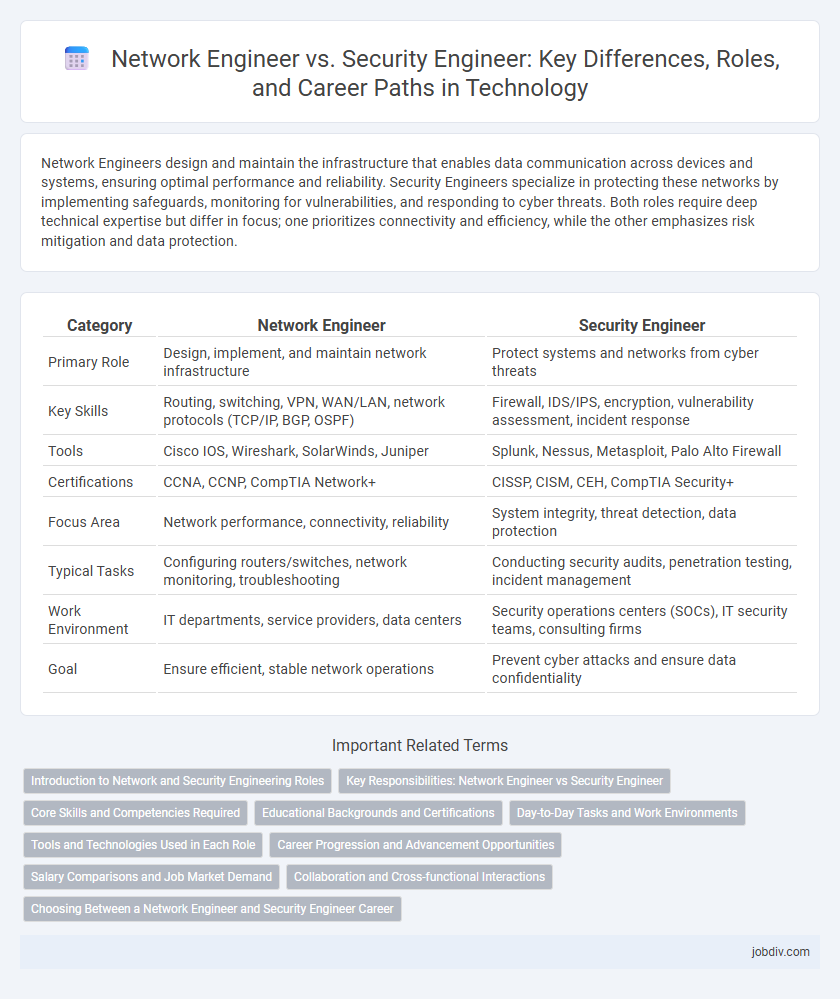Network Engineers design and maintain the infrastructure that enables data communication across devices and systems, ensuring optimal performance and reliability. Security Engineers specialize in protecting these networks by implementing safeguards, monitoring for vulnerabilities, and responding to cyber threats. Both roles require deep technical expertise but differ in focus; one prioritizes connectivity and efficiency, while the other emphasizes risk mitigation and data protection.
Table of Comparison
| Category | Network Engineer | Security Engineer |
|---|---|---|
| Primary Role | Design, implement, and maintain network infrastructure | Protect systems and networks from cyber threats |
| Key Skills | Routing, switching, VPN, WAN/LAN, network protocols (TCP/IP, BGP, OSPF) | Firewall, IDS/IPS, encryption, vulnerability assessment, incident response |
| Tools | Cisco IOS, Wireshark, SolarWinds, Juniper | Splunk, Nessus, Metasploit, Palo Alto Firewall |
| Certifications | CCNA, CCNP, CompTIA Network+ | CISSP, CISM, CEH, CompTIA Security+ |
| Focus Area | Network performance, connectivity, reliability | System integrity, threat detection, data protection |
| Typical Tasks | Configuring routers/switches, network monitoring, troubleshooting | Conducting security audits, penetration testing, incident management |
| Work Environment | IT departments, service providers, data centers | Security operations centers (SOCs), IT security teams, consulting firms |
| Goal | Ensure efficient, stable network operations | Prevent cyber attacks and ensure data confidentiality |
Introduction to Network and Security Engineering Roles
Network engineers design, implement, and maintain the infrastructure that enables data communication across local and wide-area networks, focusing on routers, switches, and network protocols such as TCP/IP. Security engineers specialize in protecting network systems by identifying vulnerabilities, implementing firewalls, intrusion detection systems, and encryption technologies to safeguard data integrity and privacy. Both roles require expertise in network architecture but differ in their primary objectives: network engineers prioritize connectivity and performance, while security engineers emphasize threat prevention and risk management.
Key Responsibilities: Network Engineer vs Security Engineer
Network Engineers design, implement, and maintain network infrastructure, ensuring optimal connectivity and performance across LANs, WANs, and wireless networks. Security Engineers focus on protecting systems by developing security protocols, monitoring network traffic for vulnerabilities, and responding to cyber threats in real time. Both roles require expertise in network architecture and protocols, but Security Engineers prioritize risk mitigation and compliance with cybersecurity standards such as ISO 27001 and NIST.
Core Skills and Competencies Required
Network Engineers require expertise in routing, switching, and network infrastructure management to ensure optimal data flow and system performance. Security Engineers focus on risk assessment, threat mitigation, and implementing robust cybersecurity protocols to protect information systems. Both roles necessitate strong problem-solving abilities, proficiency in network protocols, and knowledge of firewalls and VPN technologies.
Educational Backgrounds and Certifications
Network Engineers typically possess degrees in Computer Science, Information Technology, or Network Administration, with certifications like Cisco's CCNA and CompTIA Network+ enhancing their expertise in designing and managing network infrastructure. Security Engineers often hold degrees in Cybersecurity, Information Security, or Computer Engineering, supported by certifications such as CISSP, CEH, and CompTIA Security+ to validate their skills in protecting systems from cyber threats. Both roles demand continual education and certification renewals to stay abreast of evolving technologies and security challenges.
Day-to-Day Tasks and Work Environments
Network engineers manage and optimize the performance of computer networks by configuring routers, switches, and firewalls while troubleshooting connectivity issues. Security engineers focus on protecting network infrastructure by implementing cybersecurity protocols, conducting vulnerability assessments, and monitoring for potential threats. Both roles often collaborate in corporate IT environments but security engineers typically engage more with security operations centers (SOCs) and compliance auditing, whereas network engineers work closely with data center management and network infrastructure teams.
Tools and Technologies Used in Each Role
Network Engineers primarily utilize tools such as Cisco Packet Tracer, Wireshark, and SolarWinds for network design, configuration, and monitoring, while relying on protocols like OSPF, BGP, and MPLS for efficient data routing. Security Engineers focus on technologies including firewalls, intrusion detection systems (IDS), and security information and event management (SIEM) tools like Splunk and Snort to protect infrastructure from cyber threats. Both roles integrate automation tools such as Ansible and Python scripting to enhance operational efficiency and security posture.
Career Progression and Advancement Opportunities
Network Engineers advance by mastering complex routing protocols, cloud infrastructure, and network automation, positioning themselves for roles like Network Architect or Infrastructure Manager. Security Engineers progress through expertise in threat analysis, cybersecurity frameworks, and compliance, leading to opportunities such as Security Manager or Chief Information Security Officer (CISO). Both career paths demand continuous skill development and certifications like Cisco CCNP for Network Engineers and CISSP or CISM for Security Engineers to accelerate advancement.
Salary Comparisons and Job Market Demand
Network Engineers earn an average salary ranging from $70,000 to $110,000 annually, while Security Engineers typically command higher pay, averaging between $90,000 and $130,000 due to the increasing importance of cybersecurity. Job market demand for Security Engineers is growing rapidly as organizations invest heavily in protecting digital assets, outpacing the steady, yet slower growth seen for Network Engineers. Both roles remain vital within IT infrastructure, but Security Engineers are currently more sought after in sectors like finance, healthcare, and technology.
Collaboration and Cross-functional Interactions
Network Engineers and Security Engineers collaborate closely to ensure robust and secure IT infrastructures, combining expertise in network design and cybersecurity protocols. Effective cross-functional interactions involve sharing real-time threat intelligence and coordinating vulnerability assessments to proactively mitigate risks. Their joint efforts streamline incident response and optimize system performance, fostering a resilient and secure network environment.
Choosing Between a Network Engineer and Security Engineer Career
Choosing between a Network Engineer and Security Engineer career hinges on your passion for optimizing infrastructure or safeguarding digital assets. Network Engineers excel at designing, implementing, and maintaining robust communication systems, while Security Engineers specialize in protecting networks from cyber threats through risk assessment and mitigation. Understanding industry demand, salary trends, and required certifications like CCNA for Network Engineers and CISSP for Security Engineers aids informed career decisions.
Network Engineer vs Security Engineer Infographic

 jobdiv.com
jobdiv.com